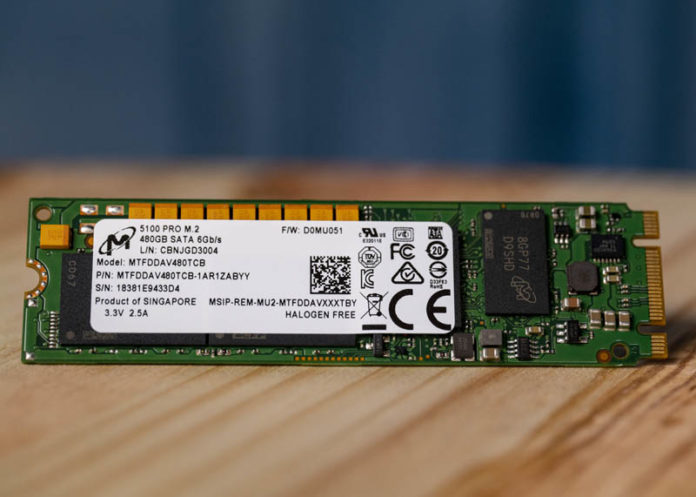The Micron 5100 Pro has become a popular M.2 SATA boot drive option in servers. As a result, we wanted to at least get it into our data set. In our brief Micron 5100 Pro benchmarks and review piece, we are going to take a look at this popular SSD and see what it has to offer.
Micron 5100 Pro 480GB M.2 SATA SSD Overview
The Micron 5100 Pro M.2 SSD is a M.2 2280 or 80mm unit. As such, it is 30mm shorter than many competitive M.2 22110 SSDs. Although this is a M.2 device, it is a SATA device, not a PCIe and NVMe SSD. Micron’s marketing materials talk about how these are performance SSDs, however, the days of a SATA SSD being considered a performance device are long gone. Instead, we look at this now as a solid-state boot device.
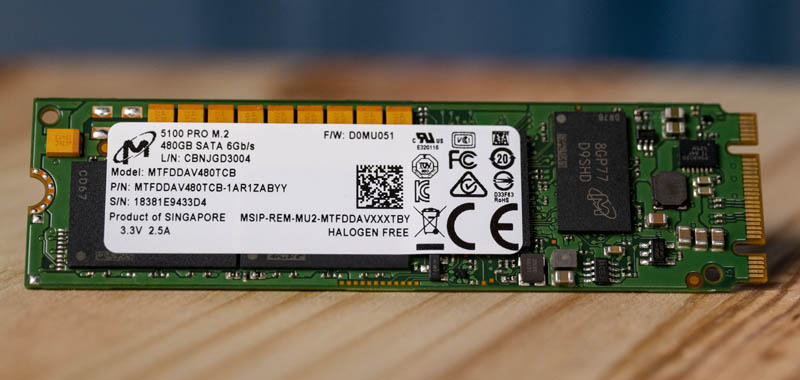
Official specs on this 3D TLC NAND drive include a 1.3PBW rating 540MB/s read and 410MB/s sequential write speeds. Random 4K IOPS are rated as 93K, 43K, and 55K for read/ write/ and 70/30 workloads. Micron also advertises its row of capacitors with better power loss protection than many other 80mm SSDs in this class. Normally we see full PLP in M.2 22110 drives.
Let us take a look at performance.
Micron 5100 Pro 480GB M.2 SATA SSD Benchmark Performance
This drive is not designed to be a server drive hammered by OLTP databases 24×7. Still, as a read cache drive, boot drive, or other lighter-duty tasks, it is serviceable. We are going to run through a few sets of numbers to test the performance claims made for the drive.
Blackmagic Disk Speed Test
This is a popular speed test in the video community. It shows whether a storage device is suitable for throughput required at a given video format.
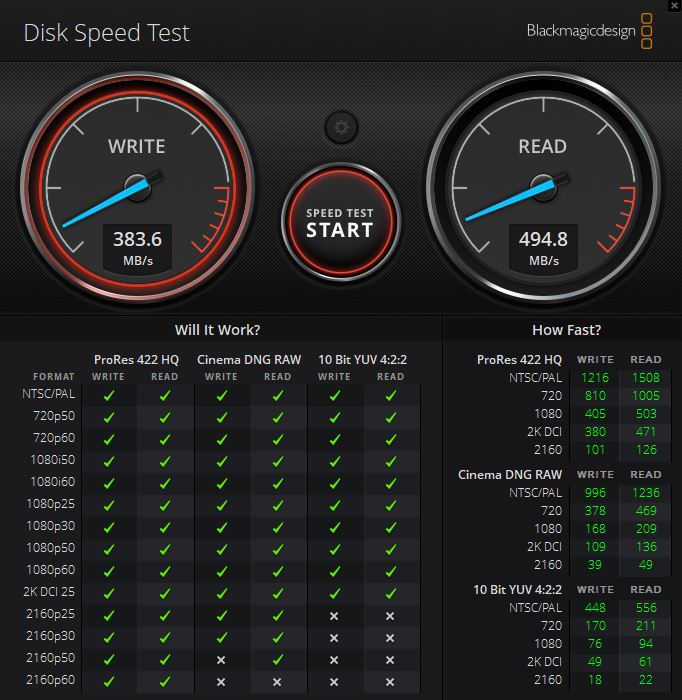
Unlike most NVMe SSDs, the SATA interface leaves the 5100 Pro 480GB unable to satisfy all of the formats on the Blackmagic Design Disk Speed Test.
Anvil’s Storage Utilities
Anvil’s Storage Utilities shows us the performance of the device along a number of common SSD performance vectors.
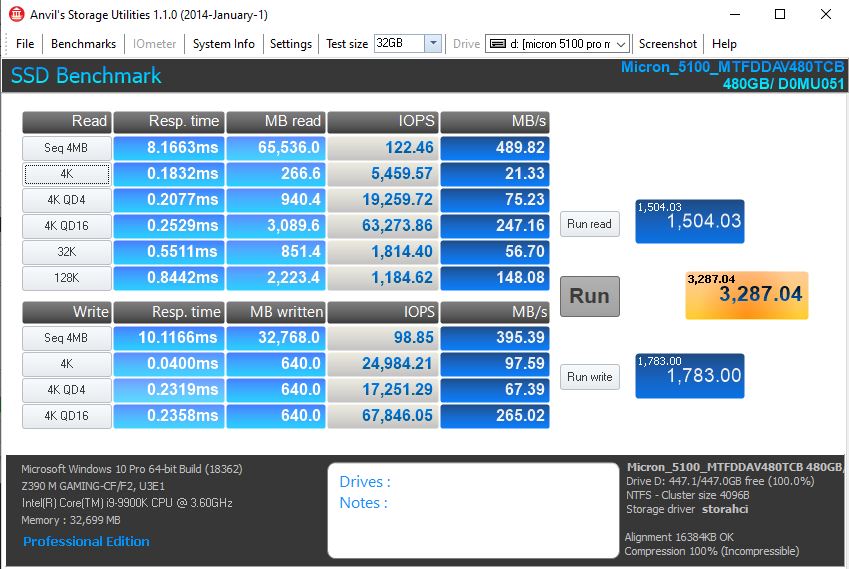
Here we can see 4K performance that is about what we would expect. It is unlikely most of these drives are going to hit high queue depths with their reads/ writes so one should keep that in mind looking at the larger IOPS numbers. Even so, on a NVMe SSD we would expect over 100K of 4K random IOPS even on inexpensive devices.
AS SSD Benchmark
AS SSD is another easy-to-use storage benchmark tool specifically for SSDs.
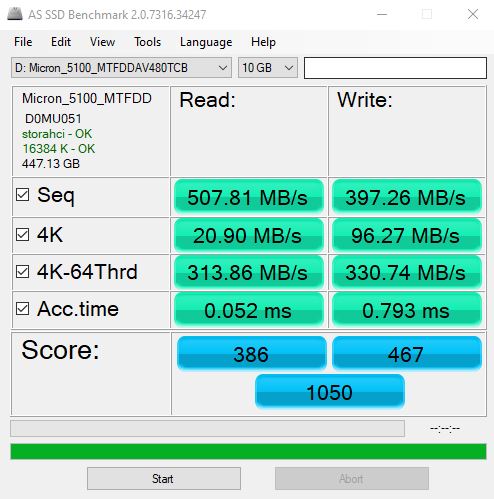
Here we see better sequential performance. We will note that we are not getting 540MB/s reads and 410MB/s writes on every test. AS SSD is getting closer to those figures.
CrystalDiskMark Benchmark
CrystalDiskMark has been around for years. It offers a different look at performance.
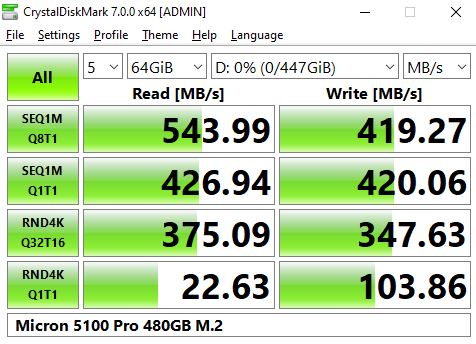
CDM shows us performance above those 540/410MB/s sequential read/ write figures for the first time.
ATTO Disk Benchmark
ATTO is a well-known tool that focuses on sequential performance.
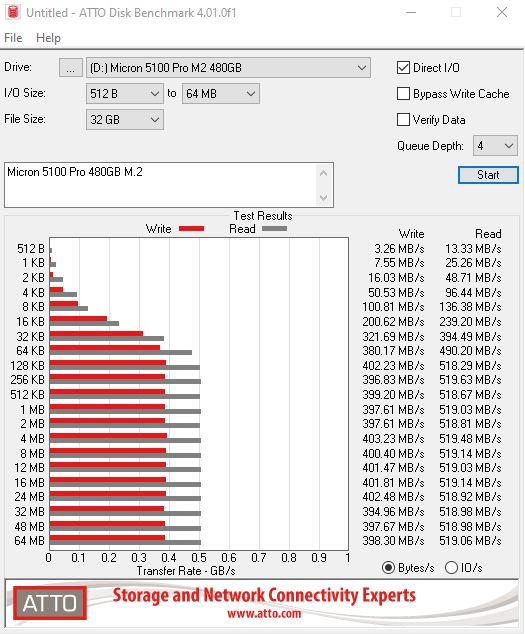
We were slightly surprised by this one but we did not hit the 540/410MB/s read/ write workloads on ATTO which usually is the benchmark that highlights best-case sequential performance.
Final Words
The 1.3PBW of endurance of this drive is frankly more than almost any of the drives will ever see. We do like the PLP capacitors on the drive as providing something over most M.2 2280 SSDs. If one reads the Micron marketing materials, one may think that this is the best SSD for everything from big data to OLTP workloads. Today we see those high-performance workloads on NVMe SSDs or 3D Xpoint memory. What was surprising was how infrequently we saw even the sequential figures reached in the short SATA test suite we use. The most common place we are seeing the Micron 5100 Pro SSD today is as a boot device on the single and dual M.2 SATA boot cards/ motherboard boot slots in servers. We think it is a great fit there, especially where server vendors and customers do not want to utilize valuable PCIe lanes for boot media.

